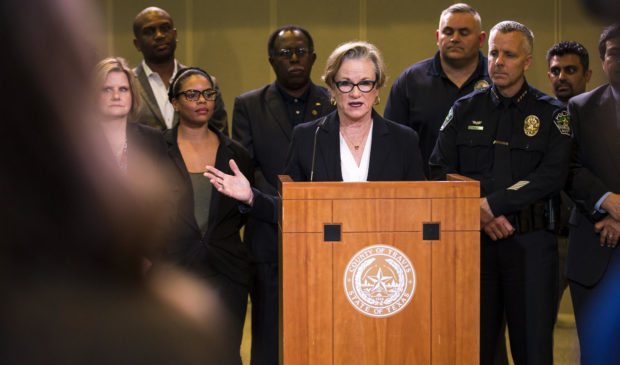Travis County DA announces not all police shootings will go before grand jury
Thursday, April 13, 2017 by
Audrey McGlinchy, KUT The Travis County District Attorney’s Office will no longer bring all police shooting cases before a grand jury. Flanked by representatives of the local NAACP, police union and the Austin Police Department, District Attorney Margaret Moore announced the changes – effective immediately.
“We, the DA’s office, the Civil Rights Division, will make a determination whether there is any evidence that the officer or officers committed a crime under the law of Texas,” said Moore, who was elected last November. “If we decide there is no such evidence, we will decline to prosecute.”
If the office decides not to prosecute, staff will post a letter on the DA’s website. The office will also host public forums to present information about cases that failed to end in charges against an officer.
Moore said the new policy will allow her staff to focus their energy on cases more likely to result in criminal charges. Assistant District Attorney Laurie Drymalla said the office will also expedite the sharing of case information with the public – including victims’ families.
“In the past, the practice of presenting every single officer-involved shooting case to a grand jury meant that the cases began to back up,” Drymalla said. “And that increased the amount of time that the families had to wait until the grand jury process was resolved until they could get answers to those questions of what happened to their loved ones.”
Ken Casaday, president of the Austin Police Association, said the new policy benefits officers, too.
“Our big issue was that officers were having to wait eight, nine, 10, 12 months to have a grand jury and that should speed up that process greatly,” said Casaday, who said he spoke with Moore about the policy before she was elected. “It’s a psychological drain on officers and their families.”
Wednesday’s changes follow a slew of campaign promises Moore has made good on since taking office in January. She created the Civil Rights Division to handle officer use-of-force cases and a special grand jury to hear only police shooting cases – as opposed to the usual practice of having grand juries sit for all types of cases.
Chas Moore of the Austin Justice Coalition said he supports the new policy, but that he has heard some reservations.
“There are concerns from some community members about, ‘Well, why does she get to make the decision about what’s important or not?’” he said. “And I can understand that. But at the same time, I can also understand the fact that just because we, the community, think that something is a violation of law, not policy … and then a cop goes to grand jury for three months and it comes back no bill (indictment). So now you have 90 days of a community anticipating something that was probably never going to happen.”
But Jim Harrington, founder of the Texas Civil Rights Project, said the policy further removes a level of independence from prosecutions. The DA’s office depends on police cooperation and testimony in criminal cases brought against civilians.
“This is someone who has to work with the police every day, depends on the cooperation of the police,” he said. “Why would we trust her to be transparent?”
Photo by Martin Do Nascimento/KUT. This story was produced as part of the Austin Monitor’s reporting partnership with KUT.
The Austin Monitor’s work is made possible by donations from the community. Though our reporting covers donors from time to time, we are careful to keep business and editorial efforts separate while maintaining transparency. A complete list of donors is available here, and our code of ethics is explained here.
You're a community leader
And we’re honored you look to us for serious, in-depth news. You know a strong community needs local and dedicated watchdog reporting. We’re here for you and that won’t change. Now will you take the powerful next step and support our nonprofit news organization?










